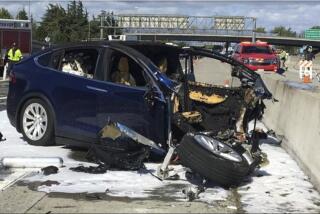Technology Behind Our <i> Angst, </i> Futurist Says : Communications: American society is uncertain about the changing from an industrial to an informational society, Toffler says.
- Share via
NEW YORK — The paradox of the 1994 election--that voters are grumpy and pessimistic despite the nation’s strong and growing economy--comes from the uncertainty people feel about the change to an information-driven society, futurist Alvin Toffler said Monday.
That uncertainty is not likely to end soon because few of the nation’s leaders understand what is happening, Toffler said at a conference of technology and media industry executives.
He noted the simultaneous troubles the United States and other industrial nations are having in their justice, health, education, urban and family systems, all of which were adapted more than a century ago for the era of mass production.
None are ready for the change away from mass production and distribution of goods, services and information, Toffler said.
“Most politicians rail against this or that crisis without understanding the larger crisis that these are all parts of,” he said.
Toffler’s books call the move to the information age the “third wave” in history.
“Why are we so worried? The reason is the old industrial-style systems are crashing and the new third-wave social and political structures are not yet in place,” Toffler said.
Focusing on communications, Toffler noted that the systems used in agrarian society, the “first wave” in his model, were inadequate for the industrial age, or “second wave.” Now second-wave systems are trying to adapt for the third wave.
Among the weaknesses companies are trying to fix in communications: inadequate interactivity, inadequate mobility, inability to simply convert information between text and speech, and poor access around the globe.
But as that transition happens and gets a lot of attention, Toffler said, politics is being quietly divided between people committed to second-wave civilization and others ready to move to the third.
“One is tenaciously dedicated to preserving the core institutions of industrial mass society, including the nuclear family, mass education system, giant corporations, mass trade unions, centralized nation-state and politics of pseudo-representation,” Toffler said. “The other recognizes that most of today’s urgent problems--energy, poverty, ecological degradation and breakdown of familial relationships--can no longer be stopped within the framework of industrial civilization.”
More to Read
Sign up for our Book Club newsletter
Get the latest news, events and more from the Los Angeles Times Book Club, and help us get L.A. reading and talking.
You may occasionally receive promotional content from the Los Angeles Times.










